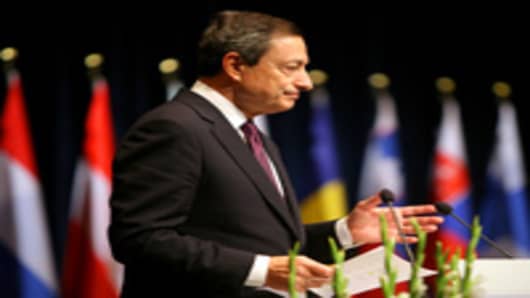Mario Draghi has warned of the costs of a eurozone break-up, breaching a taboo for a president of the European Central Bank, even as he sought to play down market expectations about the ECB’s role in combating the sovereign debt crisis.
Mr Draghi’s willingness to discuss a scenario for Europe’s 13-year old monetary union that his predecessor, Jean-Claude Trichet, simply described as “absurd,” highlights the high stakes in the eurozone debt crisis, which has rattled global financial markets.
In his first interview since becoming ECB president on November 1, Mr Draghi said struggling eurozone countries that quit the currency bloc would face still greater economic pain. For remaining members, European Union law would have been broken and “you never know how it ends really,” he said.
Countries that left and devalued their currency would create “a big inflation” and fail to escape from structural reforms that would still have to be implemented “but in a much weaker position,” Mr Draghi told the Financial Times.
To fight the crisis, Mr Draghi stressed the importance of unprecedented measures taken by the ECB to shore-up eurozone banks – which include its first ever offer of unlimited three-year loans this week.
He emphasized, however, that the region’s politicians had to take the lead in rebuilding investor confidence in eurozone public finances – by ensuring fiscal discipline and making fully operational Europe’s rescue fund, the European Financial Stability Facility .
The ECB would be able to act as agent to the EFSF in financial market operations from January – speeding its implementation, Mr Draghi said. He expressed hope that the fund’s resources would be enlarged after a review in March. “I think that if one can show its usefulness in its present size, the argument for its enlargement would be much stronger,” he said.
But Mr Draghi was cautious about commenting in detail on the ECB’s own government bond purchasing program, which has seen it acquiring more than 200 billion euros of largely southern European debt since May 2010.
Many European politicians and economists argue the only solution to the crisis is a massive escalation of the program, but just how controversial that is within the ECB was underlined over the weekend as Jürgen Stark, the bank’s top German executive, made clear it was his objections to the program that prompted his resignation.
Mr Stark, who steps down at the end of the year, said in September he was resigning due to “personal reasons”. However, Mr Stark has now told a German magazine: “There is one big topic that explains [my resignation] – I am not satisfied with how this currency union has developed.” He also alluded to the ECB bond-buying program.
Mr Draghi said the program would remain justified as long as the financial market “channels” by which its interest rate decisions are transmitted to the real economy remained “seriously impaired”. However, he stressed the EU ban on central bank funding of governments. Asked if that set limits on the ECB’s bond buying, Mr Draghi instead emphasized the need to ensure governments were “trusted on fiscal discipline and structural reforms”.
He hinted he opposed the ECB setting target limits for eurozone government bond yields or for the spread between the interest rate on German and other eurozone government debt. “Monetary policy cannot do everything,” he warned.
Mr Draghi also appeared to rule out US or UK style “quantitative easing ” – embarking on large government bond purchases to boost economic growth – even if the eurozone fell into a deep recession. “The important thing is to restore the trust of the people – citizens as well as investors – in our continent. We won’t achieve that by destroying the credibility of the ECB.”


